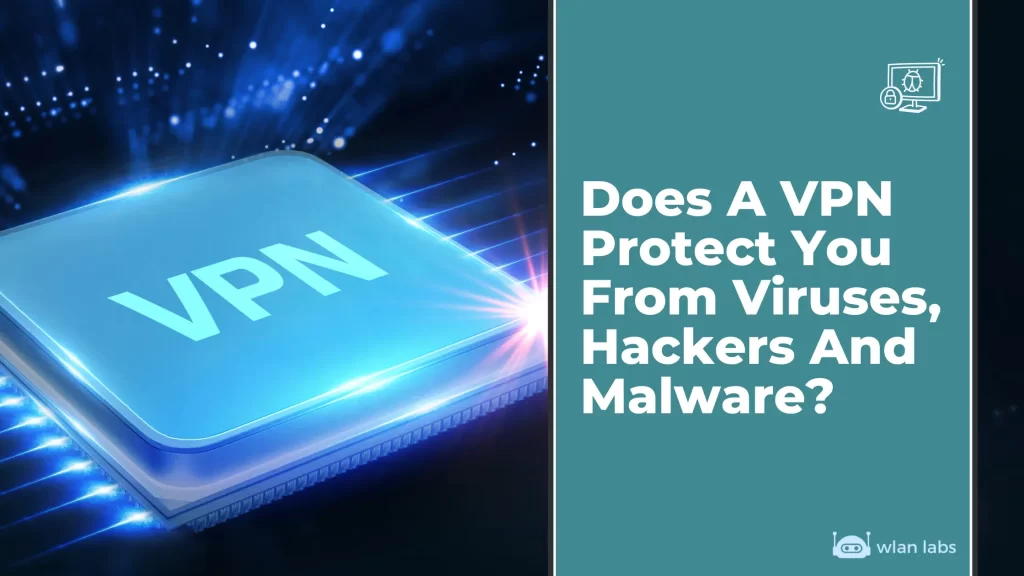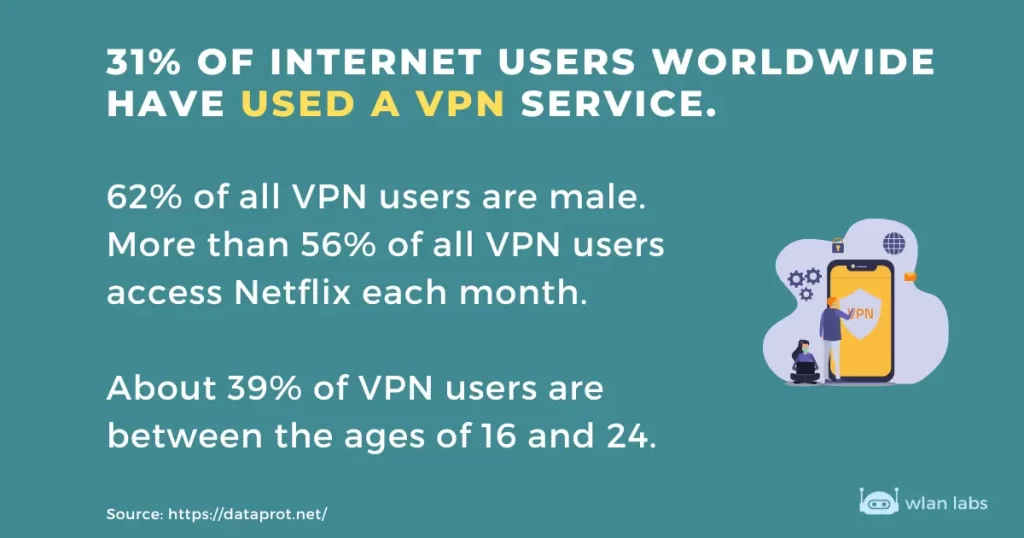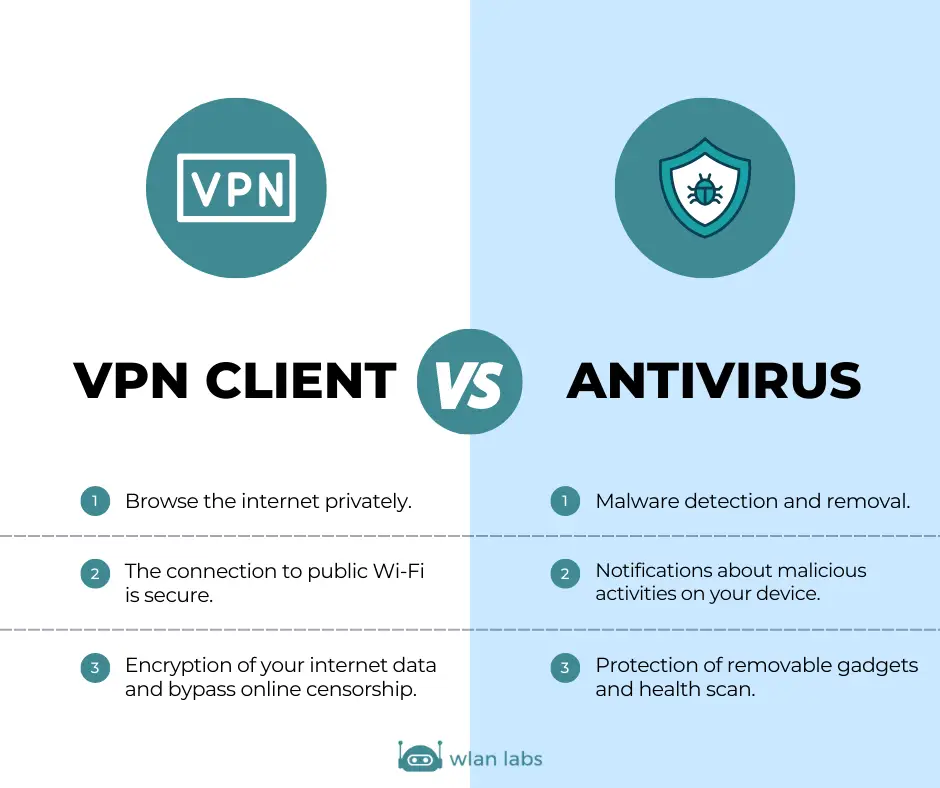
Chris Lawrence is a journalist and chief editor at Wlan Labs. He has been writing about technology for more than ten years. He writes about everything ranging from privacy to open source software. His goal is to educate readers about important topics to help make their lives easier.
If you do anything online, you want the best online protection. Online threats are everywhere, and malware attacks and malicious software are ready to strike. If you don’t take digital safety seriously, your sensitive information is in jeopardy. The big question is, does a VPN protect you from viruses?
If you’ve been looking for digital safety solutions, you probably heard of a VPN service. But will a VPN connection keep you safe from viruses? The short answer: no. But keeping your data safe from attackers goes beyond this simple answer.
If you want to keep your information safe, here’s everything you need to know about VPNs and viruses.
What Are Virtual Private Networks (VPNs)?
A virtual private network (VPN) is a service for protecting your internet connection and online privacy. The VPN creates a secure tunnel from your device to the network if you have an active internet connection.
You may think using a dedicated browser for anonymity is enough to protect your privacy, but browser extensions often give away your identity. If you want effective internet security measures to protect your privacy and connection, you need a VPN.
How Does a VPN Work?
When you use a VPN service, your virtual private network establishes a secure tunnel connection so that all your data, including your IP address, is hidden from others. The VPN works by encrypting all your information through this tunnel.
When you access the internet with a VPN, the service is the source of activity rather than the device you’re on. Your data is also encrypted, so it’s not readable to potential attackers.
The Benefits of Using a VPN Connection
Want to know more about what VPN providers can offer you as a user? This service has many benefits, so much so that usage doubles.
Remember that there’s a significant difference between a good VPN you pay for and free VPNs. VPNs provided for free have been known to sell users’ information. However, when you invest in trusted providers, you’ll get the most benefits and the best results.

Here are some you’ll find when using a secure VPN for your internet activity:
Hide Your Data
Your online activity and the data you enter from your IP address are constantly being tracked. However, when you hide your IP address and have a good VPN with military-grade encryption, your VPN secures your sensitive information, even when you’re on public Wi-Fi.
If hackers access this data exposed online, you may face many possible consequences. Hackers may impersonate you and send out malicious attachments to your contact list. They can hack your bank accounts and use your credit cards. A secure connection will keep all this at bay and prevent identity theft.
Stop Data Throttling
You may not know your data cap, but it’s there. When you have used up a lot of data, your internet service provider will slow down your speeds, throttling your access to the internet. They can measure how much data you’re using by looking at your IP address.
However, VPN users never need to worry about data throttling. A VPN masks your IP address, so not even your internet service provider will know how much data you use. This is important for everyone, particularly employees who rely on a data plan to work while traveling.
Stop Bandwidth Throttling
Bandwidth throttling is similar to data throttling but is usually used when you’re internet browsing particular websites or surfing at particular times. These could be restrictions established by your internet service provider or network administrators.
But avoid all these inconveniences with a VPN and mask what sites you’re accessing and when. If you’ve received notice of monitoring, you may choose to use a VPN for extra privacy.

Access Services That Are Geo-Blocked
Your IP address reveals much about your surfing habits, including your location. Access can be restricted based on your location, leaving you geo-blocked. This could mean you’re unable to view sites you need when traveling or missing out on streaming content that other countries get.
With a VPN, you can make it appear that you’re in another country and thus have that target country’s same access. Whether you use that power to access your bank accounts abroad or catch up on foreign TV shows is up to you.
Network Scalability
As an organization, you may have built a private network. But expanding that network as you grow as an organization or allow employees to work remotely is costly and challenging.
When you rely on a VPN, it grows with you. Suddenly, everyone on your team has the same protected virtual private network to use from anywhere as a VPN works everywhere.
Save Money on Support
You must provide all the support when you rely on an in-house server. But with a VPN, you can access your provider’s vast network of third-party support.
This means you can easily outsource your support needs to your VPN provider. This will save you money as you don’t need to pay for the necessary equipment and support staff to protect your sensitive data without losing security.
Risks Of Using A VPN
A free or paid VPN service can be a great way to protect your online privacy. However, there are also some risks associated with using a VPN.
Here are three of the most important risks to keep in mind:
- When you use a VPN, your traffic is encrypted and routed through the VPN server. This means that your ISP and anyone else snooping on your traffic will not be able to see what you are doing online. However, it is important to remember that the VPN company can still see your traffic. Additionally, government agencies may be able to request access to your data from the VPN company.
- Using a VPN will likely impact your internet speeds. This is because your traffic must travel further to reach the VPN server and then back to your device. Additionally, if the VPN server is overloaded, this can also contribute to slower speeds.
- Additionally, if you are using a public Wi-Fi network, it is important to remember that even with a VPN, someone could potentially snoop on your traffic if they are on the same network.
- Finally, it is important to remember that no security measure is perfect. While a VPN can certainly add an extra layer of security, it is not 100% foolproof.
For these reasons, it is always important to practice good online security habits, such as using strong passwords and only accessing sensitive information on secure websites.
What Are Viruses?
Viruses are types of malware infections that can change how devices operate. Like other malware, it is a malicious entity that spreads through malicious infections that hackers can trick users into downloading to their own devices.
There are various types of viruses, and they behave differently once they infect. A few of the most popular viruses include:
- Polymorphic Viruses are extremely difficult for antivirus programs to detect as they change their encoding.
- Direct Action: These are less effective as they only work while a user has opened infected files or attachments.
- Browser Hijackers: Attackers take control of a browser/online data to send users to phishing traps.
How Do Viruses Infect Your Device?
Viruses are put into effect through malicious software. A computer virus is often spread by tricking users into downloading the software. Once downloaded, the virus takes over the device, changing how it operates and views its data.
When an antivirus program is in effect, it can typically spot most threats before they take over. However, it can be difficult to stop most viruses directly once downloaded.
Why Can’t a VPN Protect Against Viruses?
As you can see, a VPN provides a secure connection for your internet activity and masks your IP address to maintain your privacy. Malware infects downloaded software. So can a VPN protect you while you’re online? Yes. But does a VPN protect you from downloading viruses? No.
Some VPN services do provide additional services, like redirecting you from suspicious websites that may contain malware. However, malware may lurk in other locations outside your internet activity.
How to Protect Your Devices Against Viruses
Whether you’re an individual or leader of an organization, you need to protect yourself from cyber threats like malware, hacking attempts, and phishing scams. But if your VPN won’t protect you, what will?
Below are the top tips for protecting yourself from viruses and keeping hackers and data thieves away from your device:
Antivirus Software
Antivirus software is an absolute must for protecting your information. Security tools like anti-virus programs can analyze any digital file, attachment, link, or site and notify you if malware is detected.
With antivirus protection, you can make informed decisions about your activity and allow the antivirus software to ward off malware.
Keep Everything Updated
Often, antivirus programs depend on a downloadable database to inform them of potentially malicious files. However, attacks update rapidly, and your computer system must be updated to take on the task of protecting you.
To keep any known viruses away, you’ll need to keep your operating system up-to-date. Outdated operating systems and software are a major crack in your cyber security armor.
Practice Good Cyber Hygiene
When you practice cyber hygiene, you avoid falling into hackers’ traps. Of course, your antivirus program can help, but human error can be a major culprit of infected system files. When human error accounts for 95% of cyber attacks, you need to be ready.
Be suspicious of sites you visit and files you open to avoid malicious websites and malware.
Scan Regularly
An antivirus program is only good if you use it. Schedule regular scans so you can spot computer viruses quickly. Scan often to identify potential malware and put the software you bought for virus protection to good use.
Keep Your Device Clean of Vulnerabilities
The old apps and other files on your computer become outdated and soon lack protection. With this major vulnerability, they can quickly become compromised files that bring malware.
Since you’re likely not scanning old files with your antivirus software, it’s best to go through and delete any outdated applications you no longer use.
Identifying Whether Your Device Is Infected
Computer viruses can still get through even with good practices and antivirus software. So how do you know if you downloaded malware that brought a virus?
Here are some signs:
- Slower speeds
- Computer crashes
- Unfamiliar programs booting up with your device
- Outgoing emails you didn’t send
- Changes to your computer’s settings and new vpn passwords
Frequently Asked Questions About A VPN Server and Viruses
Do I need virus protection if I have a VPN?
If you have a VPN, you’re protecting your internet privacy by encrypting your data and hiding your IP (internet protocol) address.
However, viruses work completely differently than hackers who may be looking to view your data. The virus will change how your device operates by infecting your device. You’ll need antivirus solutions as a separate component of your cyber attack.
Will a VPN mess with my internet connection?
If you’re experiencing data throttling, a VPN will speed up your internet. However, a VPN can slow your online traffic, but this is typically insignificant and won’t be noticed — well worth the internet security you get.
If you’re experiencing particularly slow internet speeds, check that you don’t have a virus. A virus infects through an infected attachment or malware slows down device speeds.
Is a VPN better than virus protection?
A VPN protects against unsecured network connections and ensures your data is private. Antivirus protection will prevent viruses from infecting your computer through downloaded files or email attachments.
A VPN isn’t better than antivirus protection; they’re simply two different solutions for solving different problems.
Why should I use a VPN if it won’t protect against viruses?
Antivirus software is strongly recommended to handle viruses directly. But there are online threats beyond malware.
Hackers looking to use your data can monitor your internet traffic and mobile device activity. A VPN with antivirus support is the best solution rather than just choosing one.
Does NordVPN protect against viruses?
NordVPN does not claim to protect users from viruses, but it does encrypt user data to help protect against spying and data theft.
In addition, NordVPN offers malware protection for an additional layer of security.
Is private browsing really private?
Private browsing is where your web browser does not store information about the websites you visit.
This includes cookies, history, and autofill information. Private browsing can be used on a computer or smartphone.
While private browsing is generally thought to provide privacy, there are some important exceptions to consider:
Any files downloaded and saved while in private browsing mode will be stored on your computer or device.
Private browsing does not protect your identity if you are using someone else’s computer or phone to browse the internet.
Some websites (including Google) may still be able to track your activity even if you are using private browsing mode.
Private browsing is not 100%
Does A VPN Protect You From Viruses Conclusion
A VPN is always good for supporting your digital security, but it’s not enough to keep all malware away.
However, with proper cyber hygiene and antivirus software, you can keep the viruses and other cyber attacks out of your device and let your VPN focus on what it does best: maintain your online privacy.

